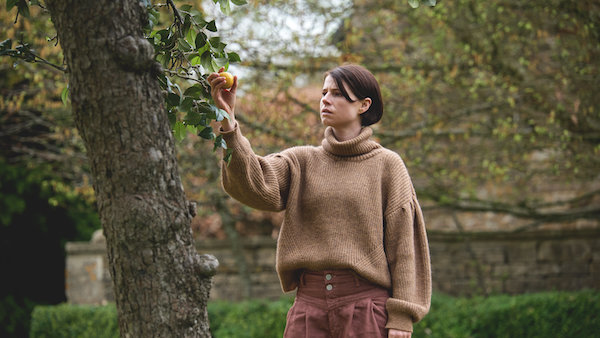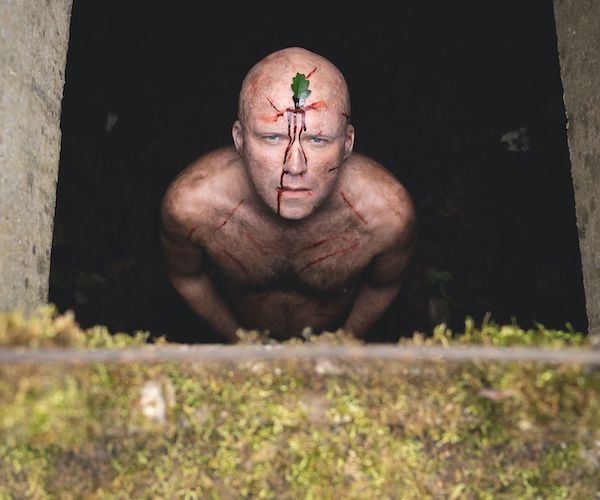Film Review: “Men” — Not This Asshole Again
By Peg Aloi
I wish I could state unequivocally that this is a film perfect for this moment in time, and perhaps it is. But not in a good way.
Men, directed by Alex Garland.

Men stars Jessie Buckley. Photo: Kevin Baker/A24
It may be that Alex Garland has, well, a thing about women. Consider his screenplay for 28 Days Later (directed by Danny Boyle), a clever twist on the zombie genre that posits a pandemic of rage that infects the blood, set loose on the world by a female animal rights activist. Even the title hints at the undertones of menstrual madness. Garland later wrote a second script that was also directed by Boyle, Sunshine, a futuristic nuclear war thriller. Then there’s Ex Machina, Garland’s first directorial effort, based on his script about a narcissistic man who builds very lifelike and intelligent female robots that serve his every need. Now comes Men, an ambitious but ultimately overwrought story that strays into both body horror and folk horror territory, though much deeper into the former, alas, than the latter. Still, the excellent cast and sure-handed stylishness make this a pretty thrilling ride, at least until the last fifteen minutes.
The deliberate and tensive aesthetic of Men is apparent immediately: a short and somewhat disturbing montage, in which we see a man falling past a window, is followed by a longer scene of a young woman (Harper, played by the always-wonderful Jessie Buckley) driving her small car through the British countryside. There is a perfectly melancholy needle drop: Lesley Duncan’s plaintive “Love Song.” Harper pulls up to a grand country estate and looks around the gardens, helping herself to an apple from the tree in front of the entrance. She then meets the owner who is renting the retreat to her, Jeffrey (Rory Kinnear), a friendly but eccentric type dressed in an oilskin jacket and Wellington boots. The house is beautifully appointed, and after a somewhat awkward tour with the bumbling host, Harper settles in and has a Facetime call with her friend Riley (Gayle Rankin) in London. It’s apparent Harper is there to heal from some recent traumatic events, and she’s chosen the perfect solitary place to do it.
Or has she? The first time she takes a walk in the nearby forest (full of bluebells, which seems odd since there are ripe apples on the trees), she finds an old train tunnel with a magical echo and happily creates lilting harmonies for a few minutes. Then she sees the silhouette of a man moving quickly towards her from the other end of the tunnel. After becoming disoriented and finally finding her way back, she spots a naked man in front of an old ruined railyard. Later that night, in a terrifying scene, the same man appears to try and break into the house. We know the naked man is played by the same actor who plays Jeffrey, so we know something is up. But after the police arrive (one of the officers also looks oddly familiar) and take the man away, Harper seems convinced that she is safe. But then she experiences some disturbing flashbacks to recent events: a fight with her husband James (Paapa Essiedu), and his sudden death.
The following day, she takes a walk to the village church, and is captivated by the ancient sculptures in the pulpit: a green man (a nature spirit whose face is covered with leaves) and a sheela-na-gig (an Irish figure that shows a crude form of a woman spreading her vagina open). Both are archetypes that were once part of ancient nature worship in the British Isles, which feels appropriate given this bucolic setting. But Harper grows emotional and cries out in anguish, observed surreptitiously by the church vicar (who, again, looks oddly familiar). When she exits the grounds she meets a young boy wearing a creepy mask of a woman’s face, who asks to play hide and seek. She gently refuses him, and he insults her. The vicar appears and tells the boy to go home. The boy also has a very familiar face. Yes, we understand, having all these men played by the same actor underscores the sameness of the interactions, the faintly creepy quality these men all have, vaguely menacing even when they’re being polite. There’s no question in my mind Kinnear deserves all the acting awards it’s possible to give him for this tour de force performance.

Roy Kinnear in Men. Photo: Kevin Baker/A24
The vicar, a calm man with a piercing gaze (all these men have different-colored eyes, an intriguing detail), asks Harper to sit down, and draws her out on her recent tragedy. As the vicar becomes overly intimate and attempts to blame Harper for her husband’s untimely end, she grows angry and leaves. At the village pub, she runs into Jeffrey, who insists on buying her a drink, as well as the police officer who tells her that the intruder was released because, apparently, hadn’t committed a crime. She leaves the room angrily, as all the pub’s patrons and barkeep, all with Rory Kinnear’s face, react silently. Buckley works her usual sorcery with this role, playing Harper’s extremes of emotion with lithe skill and nuance. Harper is disappointed her retreat has not gone as planned, upset about the lack of concern for her safety, and furious about the continual gaslighting. She tells Riley what’s happening, but when she tries to give Riley directions to the house, Harper’s phone signal cuts out, repeatedly.
This might have been a tense thriller, a story of a woman alone, grieving, who is terrorized in an unfamiliar rural location, with hints of pagan barbarity within the village church. An eerie energy emanates from the forest which causes her to lose her bearings. Nature’s beauty feels both redemptive and threatening, which seems to be the point. It is classic folk horror. The location is peaceful yet thrums with a palpable energy that is decidedly unpleasant. Kudos to cinematographer Rob Hardy, and composers Ben Salisbury and Geoff Barrow, all of whom also worked with Garland on Ex Machina and Annihilation, for visuals and music that provide a lush, beautiful, and consistently unsettling mise en scene. Harper begins to see horrific things that clearly aren’t real, calling into question the nature of what is happening to her: is she imagining it, or has she somehow conjured it up in this strange, evocative place?
But Garland chooses to take the story in a wild direction, seeming to want to comment on many things at once: trauma, grief, toxic masculinity, Jungian archetypes that codify sex and gender, institutionalized misogyny, etc. There’s no overt causality or clumsy exposition supplied, as we sometimes see in badly-written horror films. Things merely happen: some of them are uncanny and terrifying, but they are part of a larger vision. Sometimes these bizarre moments are pulled off with subtlety and grace, as when the apple tree shudders and drops all its fruit at once. Or when the abandoned tunnel, full of water that reflects the forest trees, is filled with haunting melodies like Gregorian chant. Or when the vicar tells Harper he has decided she is “an expert in carnality,” echoing the words of the 15th century witch hunting manual, the Malleus Maleficarum, which states “all witchcraft stems from carnal desire, which is in women insatiable.” But, as events escalate, Garland indulges in a relentless scene of unrestrained visceral body horror that some viewers might find, well, gratuitous. I certainly did.
I mean, we get it. Nature, sex, predation, dominance, nurturing, blah blah blah. Men are terrible and women don’t deserve the centuries of disrespect, oppression, and brutality they’ve suffered under the patriarchy. But Garland also can’t seem to help himself from suggesting that women are partly to blame for men’s choices. Or maybe he’s pointing out that this scapegoating is part of the problem. Hard to say. I wish I could state unequivocally that this is a film perfect for this moment in time, and perhaps it is. But not in a good way. Still, I found Men compelling, and provocative, and hard to shake off.
Peg Aloi is a former film critic for the Boston Phoenix and member of the Boston Society of Film Critics. She taught film studies in Boston for over a decade. She’s written on film, TV, and culture for web publications like Time, Vice, Polygon, Bustle, Mic, Orlando Weekly, RadioTimes, and Bloody Disgusting. Her blog “The Witching Hour” can be found on Substack.
